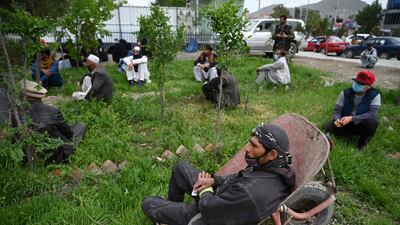The International Monetary Fund approved $220 million (Dh808m) in emergency assistance for Afghanistan to help the country cope with the economic fallout from the coronavirus pandemic.
The disbursement will help Afghan authorities plug an urgent balance of payments gap in 2020 and fund pandemic-related spending on health and social relief, the Washington-based lender said in a statement on Friday. Discussions on a new IMF arrangement may start "soon," depending on how the pandemic evolves.
"The Covid-19 pandemic has hit hard Afghanistan’s economy," Mitsuhiro Furusawa, the IMF's deputy managing director and chair, said. "The shock has generated a large balance of payments need. Emergency financing from the IMF under the Rapid Credit Facility would help meet this urgent need and create room for pandemic-related spending, including by catalyzing donor financing.”
The coronavirus outlook and measures to contain it have worsened the country's economic outlook. Afghanistan's economy is forecast to contract 3 per cent this year, assuming the pandemic is contained by the third quarter, a major reversal from the 3.5 per cent expansion previously projected. The country's fiscal deficit will widen to 3.5 per cent of the gross domestic product due to urgent pandemic-related spending and revenue losses.
The balance of payments gap is estimated at $857m or 4.5 per cent of GDP. Afghan authorities are also seeking financing from other sources to mitigate the impact on the already fragile economy, burdened by ongoing conflict and political uncertainty.
Afghanistan recorded 2,335 confirmed coronavirus cases and the death toll stood at 68, according to the Johns Hopkins University, which is tracking the pandemic globally.
Worldwide, the number of coronavirus cases has exceeded 3.3 billion while the death toll reached 238,787 as of Saturday. A total of 1,053,419 people have recovered.
The pandemic has hammered the global economy, which is set to contract 3 per cent this year and is projected to slide into the deepest recession since the Great Depression of the 1930s. The outbreak has hampered international trade and paralysed the airline industry and hospitality sector.
"Trade has been disrupted and domestic activity has slowed sharply as measures have been taken to contain the virus," Mr Furusawa said. "As a result, the economy is set to contract in 2020, leading to a rise in unemployment and poverty."
The IMF urged authorities to accommodate emergency health spending and social relief to affected households by allowing a higher fiscal deficit and mobilizing donor grants. It also called for cutting non-essential spending and taking revenue measures to contain the fiscal deficit.
The authorities reiterated their request for a new IMF arrangement to support their economic reforms and discussions could start "soon," the IMF said in its report. Support could take the form of a prospective programme or through a request for another Rapid Credit Facility disbursement.
The IMF and World Bank have been offering emergency funds to developing and low-income nations across the world to bolster their efforts to fight the rapidly spreading deadly virus.
Last month, the World Bank approved an initial $1.9 billion in emergency aid for coronavirus spending to 25 developing countries, including $100m for Afghanistan.


